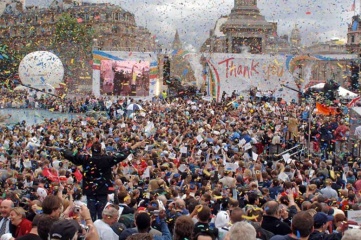By 2040, a generation will have passed since London last staged the Olympic and Paralympic Games. For many, the summer of 2012 is etched in their minds as a moment of national pride and global admiration. But when you pause to consider how much the world will have changed by the time the Games could return to the capital, it becomes clear this wouldn’t just be a nostalgic repeat. It would be a reinvention.
In 15 years’ time, today’s children will be the athletes, creators and consumers that brands are trying to reach. They will not even remember the last home Games, and their interests, viewing habits and social values will be shaped by forces that might not currently exist. AI-driven media, decentralised content platforms, and shifting definitions of sport and fandom will redraw the entire engagement model.
Any city that can help the IOC adapt to that future stands to gain, and London is well placed to lead.
The rise of lifestyle sports and new medal moments
The data already shows the shift in motion. According to the 2025 EY Sports Engagement Index, 72% of UK respondents consider themselves “core sports engagers.” But what they mean by “sport” is changing.
It’s no longer just about elite competitions or season tickets. The fastest-growing areas of participation are lifestyle-led: basketball, hiking, running, swimming.
Sports that are as much about community and wellness as they are about medals. The generation growing up on Strava, YouTube Shorts and shared step counts is more likely to be inspired to watch and play by local participation over paywalled content.
This isn’t bad news for the Olympics, quite the opposite. It’s a chance to meet young people where they already are. A future London Olympics could shine a light on sports that resonate with younger audiences in new ways.
Disciplines like skateboarding, climbing and 3x3 basketball have already made their debut, and more could follow. For National Olympic Committees, these newer sports represent fresh medal potential. For sponsors, they offer storytelling opportunities rooted in identity and culture, over competition.
A host city for the digital age
Equally, the shift towards more gender-balanced and inclusive formats continues to reshape what fans expect from the Games. Events like mixed relays and doubles in newer sports make sense not just in the name of fairness, but in engagement too. They reflect a world where audiences care as much about representation as results. Combined with the growing popularity of wellness culture, there’s a much broader canvas to paint on, one that spans physical spaces and digital touchpoints.
That’s where the media landscape becomes central.
By 2040, AI will have transformed content creation. The way fans discover, watch and interact with Olympic moments won’t be through linear TV alone. It will happen through smart filters, reactive content and decentralised social ecosystems we haven’t even named yet. Signs of the shift are already clear: the unified Olympics social channels generated 1.1 billion engagements in June 2024 alone, triple the levels recorded before Tokyo 2020. Nearly 40 per cent of that digital audience is under 34, showing how the Games already live inside youth culture.
This is where London’s strength as a global media and tech hub comes into play. Any host city needs to offer more than venues; it needs to offer vision. And London is well placed to act as a bridge between tradition and transformation.
At the same time, competition among host cities is intensifying. Saudi Arabia and the UAE are spending heavily to secure global sports rights as part of their long-term plans to transition from oil dependency to destination economies. Rights holders and emerging sports are looking at cities not only as locations, but as revenue sources. And in return, cities are betting on footfall, tourism and cultural relevance.
This is a hearts and minds business. If global sports rightsholders know that London is open for business, they are far more likely to bring high-value events to the UK.
Craving for shared context
Of course, every Olympic bid comes with questions about cost, legacy and impact. And it’s fair to say that, even with much of the 2012 infrastructure still in place, the economics are complicated. But what often gets overlooked in those conversations is the value of cultural momentum.
Events like the Olympics have the power to influence generational health habits, drive community participation, and put cities on the global stage in a way that shapes their future far beyond the closing ceremony. They offer a reason to rally around shared purpose, something that feels increasingly scarce.
That collective energy matters, especially for marketers. Because whatever form the Olympic content experience takes in 2040, attention will be more fragmented than ever. Having a single event that cuts through, where people gather physically and digitally to experience something together, is rare and valuable. It’s the kind of shared context brands crave, particularly when trying to connect with younger, more purpose-led audiences.
That’s why the smart money is already thinking ahead. London 2040 wouldn’t just be a sporting event. It would be a moment to reset what fan engagement looks like. It would be a platform for health and inclusivity, powered by technology but rooted in emotion. For brands and rights holders alike, it could offer the chance to rebuild trust, relevance and reach with an audience that’s rewriting the rules.
London has done it before, but the real opportunity lies in doing it differently. If that happens in 2040, we won’t just be looking back at 2012 with pride. We’ll be looking forward with purpose.


